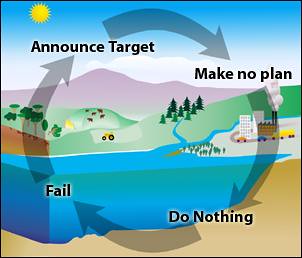The government is proposing to gazette a formal climate change target of "50 by 50": a 50% reduction in emissions from 1990 levels by 2050. So what does it actually mean? What practical effect does it have?
Virtually none. While the government is legally obliged to set a target, the only impact it has is that the regular reviews of the ETS - the first of which has just begun - must consider it. It will have no impact on the current review, because the law specifically states that reviews must only consider "any targets that are in effect... at the time the review is initiated". As for future reviews, the government's target is only one factor to be considered among many, and will be balanced against international obligations, economic impacts, and trade effects. In other words, what we're looking at is a meaningless aspirational statement. It has the appearance of a formal commitment, but in practice it means nothing.
That's National's climate change policy in a nutshell, really. Pretend to do something while really doing nothing.
But the thing which really undermines it and makes it utterly meaningless is the generous subsidies for polluters in the ETS. These decay exponentially at a rate of 1.3% a year, so in 2050 those polluters covered - farmers (if they are included at all) and eligible industrial emitters (which includes just about everybody) will still being subsidised for 53% of their 2050 emissions. This is estimated to amount to more than 40 million units a year in 2050 (see graph; source here [PDF]) - which is just over 70% of 1990 emissions levels.
So, the government's "plan" is to set a target of a 50% reduction, while legally committing to fail to meet it. Sounds familiar, doesn't it?

It would be nice if we could have serious climate change policy for once. Policy wasn't self-undermining and designed to fail from the outset. But that's just too much to expect from National.





